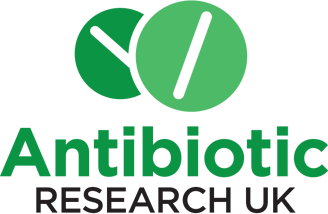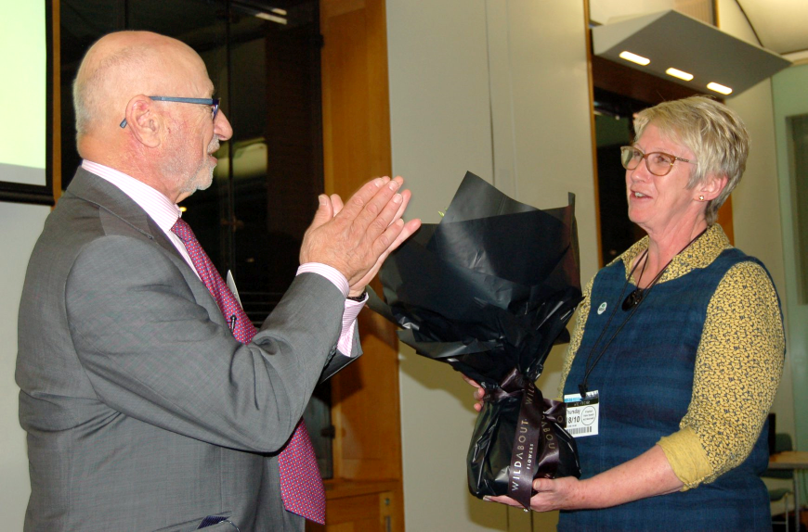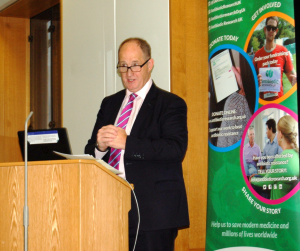Now that I (Colin Garner, Chief Executive) have got my breath back, I thought it worth putting down a few thoughts and reflections about the 2018 Annual Lecture event held in Portcullis House, Palace of Westminster. The event is held in this venue since we hope that members of the Commons and Lords might attend. Other than my local MP The Rt Hon Kevin Hollinrake (about more later) not a single member turned up. I know BREXIT figures large on politicians minds presently but antibiotic resistance will still be with us long after the memories of BREXIT have faded into history. The disinterest by Government in the problem of antibiotic resistance was confirmed in a publication by the Health and Social Care Committee whose REPORT on AMR was issued on 22 October 2018 saying that the impetus for tackling AMR post the O’Neill AMR review had been lost; there had not been a single formal cross Ministry meeting on the topic in the past 15 months.
The annual meeting was opened by the charity’s chair Ashley Burgess OBE who described the progress the charity had made since last year’s Annual Lecture. He appealed for donors to come forward to help in the charity’s mission of research, education and patient support.
He then invited Kevin Hollinrake, MP for Thirsk and Malton to open the afternoon’s proceedings. Kevin has actively campaigned in the House on behalf of ANTRUK and has raised many questions and organised Westminster Hall debates on the topic of AMR. He told the audience that he was endeavouring to do what he could to raise the profile of AMR in Government but was not gaining much traction for his efforts. His most recent question in the House concerned a 10% tax on antibiotics The purpose of the tax would be to raise $3 billion to fund research into new antibiotics, diagnostics and other avenues to tackle AMR. The Minister responsible Steve Brine gave a non-committal reply to the question.
Following on from Kevin’s opening remarks a talk by an AMR patient Annabelle Armitage was given (see Annabelle’s talk HERE). Annabelle had a riding accident in which the bones of her leg were broken. The broken bones punctured her skin so that she had to have metal pins in a frame inserted to repair the damage. As a result Annabelle picked up an infection which ultimately took 12 years of treatment to heal. She almost had to have her leg amputated and to make things even more difficult she picked up another infection at the site where skin had been removed to graft onto her injured leg. Annabelle was remarkably non-plussed by the whole experience and yet what she had gone through what must have been a nightmare ordeal.
At this point in the meeting proceedings a Short Film prepared by the charity was shown celebrating the 90th anniversary of the discovery of penicillin.
We were delighted to include in the film an interview with Nurse Sarah Whitlow, the granddaughter of the discoverer of penicillin Sir Alexander Fleming. The charity w

as made a presentation to Sarah in recognition of her grandfather’s contribution to medicine. We are pleased to announce that Sarah has agreed to be an ANTRUK Charity Ambassador.
Following on from the presentation, Professor Paul Little, University of Southampton talked about his research journey from Nepal to flesh eating bugs. His presentation will appear HERE shortly. The take home message from Pauls’ talk was;
Professor Little’s research into antibiotic prescribing has led to NICE recommending
1) that delayed antibiotic prescriptions should be considered by GPs routine practice in the management of respiratory tract infections
2) that GPs use an empirical scoring system (FeverPain) for sore throats which improves symptom control and lowers antibiotic use.
In addition his work on chest infections suggests that antibiotic intervention is of no cl inical benefit in helping illness resolution for uncomplicated chest infections; patients should be informed that it can take up to three weeks for the body to clear a chest infection. Finally remedies such as steam treatment or ibuprofen are ineffective in treating chest infections.
inical benefit in helping illness resolution for uncomplicated chest infections; patients should be informed that it can take up to three weeks for the body to clear a chest infection. Finally remedies such as steam treatment or ibuprofen are ineffective in treating chest infections.
The charity cannot function without funds and we are extremely grateful to our fundraisers who work tirelessly to raise money for us. A short thank you presentation was shown and you can watch it HERE.
Following on from the fundraiser’s thank you video, Professor Christine Bond, University of Aberdeen and Chair of the charity’s Education Committee talked about the role of the Committee in helping to fulfil one of the charity’s missions of educating the public. She also talk about the upcoming recruitment of a Patient Support Officer and other activities to support patients and their families. Click HERE for Professor Bond’s presentation
Finally I concluded the afternoon’s events prior to the charity’s AGM by HIGHLIGHTING WAYS that people can help the charity raise funds and that we still needed to raise £150,000 by the end of the year to reach our 2018 target of £0.5 million.
Overall a highly successful afternoon not only to raise the profile of our charity but just as importantly to highlight the problem of antibiotic resistance. Please help us tackle this major threat by DONATING



